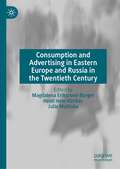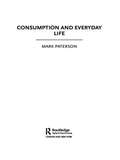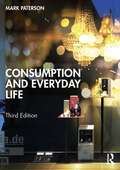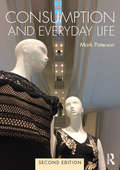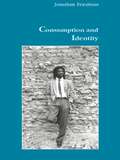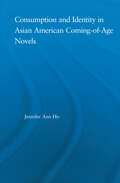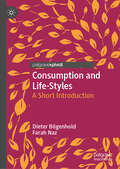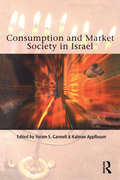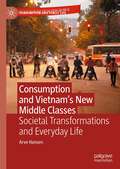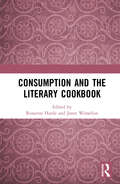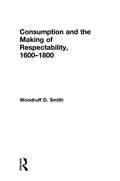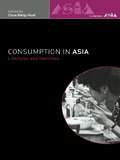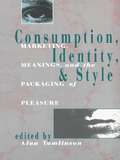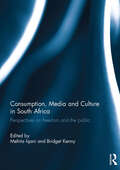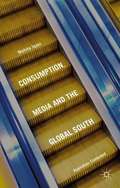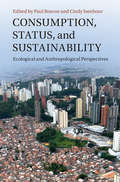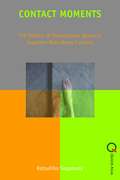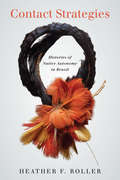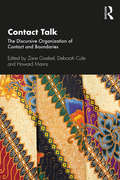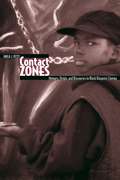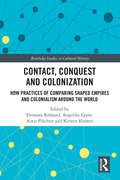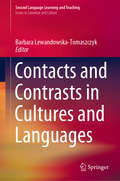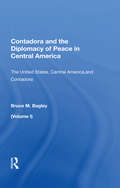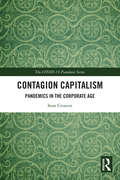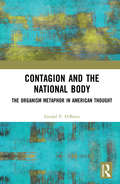- Table View
- List View
Consumption and Advertising in Eastern Europe and Russia in the Twentieth Century
by Heidi Hein-Kircher Magdalena Eriksroed-Burger Julia MalitskaThis book explores Eastern European consumer cultures in the twentieth century, taking a comparative perspective and conceptualizing the peculiarities of consumption in the region. Contributions cover lifestyles and marketing strategies in imperial contexts in the late nineteenth and early twentieth centuries; urban consumer cultures in the Interwar Period; and consumer and advertising cultures in the Soviet Union and its satellite republics. It traces the development of marketing throughout the century, and the changes in society brought about by democratization and the 'Americanization' of consumption. Taken together, the essays gathered here make a valuable contribution to our understanding of consumption and advertising in the region.
Consumption and Everyday Life
by Mark PatersonIntroducing all the key ideas and major theorists of consumption in a lively and engaging manner, this book draws on theories of everyday life and aspects of sociology, cultural geography and cultural studies, and presents a comprehensive exploration of the central themes in consumption and consumer culture. Readily accessible case studies describe familiar forms of consumption from areas of everyday life, grounding the debates and ideas discussed. Key topics covered include: the semiotics of branding and advertising the representation of 'nature' and the environment the relations between consumer and producer ethical consumption the tensions between local spaces of consumption and globalized markets. While each of the chapters crystallize the debate in a specific subject area, they also lie within a larger argument concerning the ethics, the poetics and the politics of consumption in everyday life, making this essential reading for undergraduates on cultural studies, sociology and cultural geography courses.
Consumption and Everyday Life
by Mark PatersonWith an emphasis on everyday life, this respected text offers a lively and perceptive account of the key theories and ideas which dominate the field of consumption and consumer culture. This third revised and expanded edition is a major update of the text of the second edition, adding new chapters on youth culture and consumption, retail psychology, gender and consumption, the globalization of food, and digital consumption and platform capitalism. Theoretical perspectives are introduced such as theories of practice, critical theory, semiotics, and psychoanalysis. Examples from film, literature, and television are used to illustrate concepts and trends in consumption, and a wide range of engaging and up-to-date case studies of consumption are employed throughout. Historical context is provided to help the reader understand how we became consumers in the first place. Written by an experienced teacher, the book offers an accessible and thought-provoking introduction to the concept of consumption for students in sociology, cultural studies, human geography, history, anthropology, and social psychology.
Consumption and Everyday Life: 2nd edition (The\new Sociology Ser.)
by Mark PatersonWith an emphasis on everyday life, this respected text offers a lively and perceptive account of the key theories and ideas which dominate the field of consumption and consumer culture. Engaging case studies describe forms of consumption familiar to the student, provide some historical context, and illustrate how a range of theoretical perspectives – from theories of practice, to semiotics, to psychoanalysis – apply. Written by an experienced teacher, the book offers a comprehensive grounding drawing on the literature in sociology, geography, cultural studies, and anthropology. This new revised and expanded edition includes more extended discussion of gender, the senses, sustainability, globalization, and the environment, as well as a brand-new chapter on the ethics of consumption.
Consumption and Identity (Studies In Anthropology And History Ser. #Vol. 15.)
by Jonathan FriedmanFirst published in 2004. Routledge is an imprint of Taylor & Francis, an informa company.
Consumption and Identity in Asian American Coming-of-Age Novels (Studies in Asian Americans)
by Jennifer HoThis interdisciplinary study examines the theme of consumption in Asian American literature, connection representations of cooking and eating with ethnic identity formation. Using four discrete modes of identification--historic pride, consumerism, mourning, and fusion--Jennifer Ho examines how Asian American adolescents challenge and revise their cultural legacies and experiment with alternative ethnic affiliations through their relationships to food.
Consumption and Life-Styles: A Short Introduction
by Dieter Bögenhold Farah NazThis book takes an interdisciplinary approach to the world of consumption, covering different topics and including sociological, economic and marketing aspects. The term ‘consumption’ is vague and even in academic disciplines the term is used in a variety of ways. Consumption research asks how earnings and spending are related to each other. More generally, consumption research investigates how people, social classes or societies realize their consumption practices. The question of how consistent preference structures are due to changing empirical backgrounds of time, space and related culture is frequently asked. Which context variables (historical time, geographical framework, cultural background) specify the practice of consumption and in which way do attributes such as age, gender, class, occupation and life-style have their own impacts on the way in which consumption is realised?This book will be of interest to researchers working in economics, sociology, marketing, aesthetics and design, anthropology and communication studies.
Consumption and Market Society in Israel
by Kalman Applbaum Yoram S. CarmeliOver the past two decades, Israel has been remaking itself in line with the commercial models of Western market societies. Nowhere is this trend more evident than in private consumption patterns. Most Israelis crave parity with Western lifestyles - private automobiles, mobile phones, spacious housing fashionably furnished, accessibility to shopping malls and leisure travel abroad. Alongside these new aspirations, internationally branded commodities and franchises such as McDonald's, Office Depot, Benetton, IKEA and Toys 'R' Us increasingly feature in the Israeli landscape, and advertising has emerged as a primary vehicle for persuasion, competition and cultural expression. This book is the first to explore fully the significance of these transformations. The authors show how different groups - kibbutzniks, Israeli Arabs, Ultra-Orthodox Jews, new immigrants and middle-class Israelis - alternately exhibit a suspicion towards and enthusiasm for the enhanced individual freedoms of a consumer market society. Lifestyle consumerism is recognized as an alien import, potentially disruptive of the ethos of communality, common destiny and national purpose. At the same time, because consumption helps unite diverse groups to the greater whole of the nation, the globe, and modernity, it conveys a sense of normalcy and affluence in a time of major social transition and political turmoil. Consumption and Market Society in Israel is not only innovative in its research, but it is a timely contribution to a hotly debated topic.
Consumption and Vietnam’s New Middle Classes: Societal Transformations and Everyday Life (Consumption and Public Life)
by Arve HansenThis book studies the dramatic changes in consumption patterns in Vietnam over the past decades, combining a focus on everyday practices and societal transformations. Zooming in on the new urban middle classes, and through in-depth case studies in the realms of mobility, food and energy, the book brings new insights to some of the most urgent global sustainability challenges. Based on a decade of research in Vietnam, the book aims to contribute to better understanding one of the most fascinating ‘development success stories’ in the world. It introduces the term ‘consumer socialism’ to analyse some of the contradictions embedded in the socialist market economy. Simultaneously, the book aims to contribute to strengthening consumption research in and on emerging economies, and for this purpose develops a theoretical approach focusing on social practices and the political economy of consumption.
Consumption and the Literary Cookbook
by Roxanne Harde and Janet WesseliusConsumption and the Literary Cookbook offers readers the first book-length study of literary cookbooks. Imagining the genre more broadly to include narratives laden with recipes, cookbooks based on cultural productions including films, plays, and television series, and cookbooks that reflected and/or shaped cultural and historical narratives, the contributors draw on the tools of literary and cultural studies to closely read a diverse corpus of cookbooks. By focusing on themes of consumption—gastronomical and rhetorical—the sixteen chapters utilize the recipes and the narratives surrounding them as lenses to study identity, society, history, and culture. The chapters in this book reflect the current popularity of foodie culture as they offer entertaining analyses of cookbooks, the stories they tell, and the stories told about them.
Consumption and the Making of Respectability, 1600-1800
by Woodruff SmithTying together of several distinct cultural patterns during this century to create a culture of respectability and its impact on popular culture, trade, politics, social dynamics, and literature, this original and thoughtful work provides a comprehensive and much-needed understanding of the origins of modern consumption and all of its cultural impl
Consumption in Asia: Lifestyle and Identities (The New Rich in Asia)
by Chua Beng-HuatThe essays in this collection challenge conventional ideas about consumption and consumerism: they consider if the inundation of Western consumer goods have created identity confusions among the affluent in Asia, and if the expansion of consumer culture really does threaten the stability of politically anti-liberal states in Asia. This is the first book to analyse in detial consumerism in the region, and will be valuable reading for students and researchers in Asian studies, economics, politics and cultural studies.
Consumption, Identity and Style: Marketing, meanings, and the packaging of pleasure (Comedia)
by Alan TomlinsonFirst Published in 1990. Routledge is an imprint of Taylor & Francis, an informa company.
Consumption, Media and Culture in South Africa: Perspectives on Freedom and the Public
by Mehita Iqani and Bridget KennyThis book is the first of its kind to bring together a collection of critical scholarly work on consumer culture in South Africa, exploring the cultural, political, economic, and social aspects of consumption in post-Apartheid society. From sushi and Japanese diplomacy to Queen Sophie’s writhing gown, from middle class Sowetan golfers to an indebted working class citizenry, from wedding websites to wedding nostalgia, from the liberation of consuming to the low wage labour of selling, the chapters in this book demonstrate a variety of themes, showing that to start with consumption, rather than ending with it, allows for new insights into long-standing areas of social research. By mapping, exploring and theorizing the diverse aspects of consumption and consumer culture, the volume collectively works towards a fresh set of empirically rooted conceptual commentaries on the politics, economics, and social dynamics of modern South Africa. This effort, in turn, can serve as a foundation for thinking less parochially about neoliberal power and consumer culture. On a global scale, studying consumption in South Africa matters because in some ways the country serves as a microcosm for global patterns of income inequality, race-based economic oppression, and hopes for the material betterment of life. By exploring what consumption means on the ‘local’ scale in South Africa, the possibility arises to trace new global links and dissonances. This book was originally published as a special issue of Critical Arts.
Consumption, Media and the Global South: Aspiration Contested
by Mehita IqaniWhat does consumption in the global south signify, and how are its complexities communicated in media discourses? This book looks at the media representation of consumer culture in Africa, China, Brazil and India through case studies ranging from celebrity selfies, to travel websites, news reports and documentary film.
Consumption, Status, and Sustainability: Ecological and Anthropological Perspectives (New Directions in Sustainability and Society)
by Cindy Isenhour Paul RoscoeThis volume addresses current concerns about the climate and environmental sustainability by exploring one of the key drivers of contemporary environmental problems: the role of status competition in generating what we consume, and what we throw away, to the detriment of the planet. Across time and space, humans have pursued social status in many different ways - through ritual purity, singing or dancing, child-bearing, bodily deformation, even headhunting. In many of the world's most consumptive societies, however, consumption has become closely tied to how individuals build and communicate status. Given this tight link, people will be reluctant to reduce consumption levels – and environmental impact -- and forego their ability to communicate or improve their social standing. Drawing on cross-cultural and archaeological evidence, this book asks how a stronger understanding of the links between status and consumption across time, space, and culture might bend the curve towards a more sustainable future.
Contact Moments: The Politics of Intercultural Desire in Japanese Male-Queer Cultures
by Katsuhiko SuganumaThis book sheds light on 'contact moments' between Japanese male-queer culture and that of the West in the postwar period, and critiques various contemporary examples of persistent Orientalism and nativism. Focusing on a range of Japanese as well as English male-queer materials including magazines, memoirs and cybertexts, Suganuma shows how the interactions of the two cultures affected the subject formation process of queer selves. The instances examined range from the hentai magazines of the 1950s and their depiction of men who had sex with foreign men (mostly American servicemen); the depiction of race in the magazine Barazoku; John Whittier Treat's memoir of his sabbatical in Japan and his depiction of his own Orientalism; the writings and strategies of OCCUR and Fushimi in the 1990s; and the GJN news site. The author sees the depiction of and reaction to Japanese men who had sex with foreigners in the hentai magazines as part of a larger pattern of representation manifesting gender anxieties among Japanese men (both heterosexual and homosexual) who found themselves feminized by defeat in the war. He draws on Dyer's understanding of whiteness as a flexible default position in his discussion of Barazoku, but argues that in this case Japaneseness is the default position and whiteness is othered. In his final chapter, he argues for an understanding of the activities of GJN also as a space of mediation rather than simply as a wholesale importation of American or 'global gay' culture. Suganuma argues that the binaries of cross-cultural comparison (local/global, Japan/West, acts/identities, and us/them) can be generative and productive as well as repressive and reductive.
Contact Strategies: Histories of Native Autonomy in Brazil
by Heather F. RollerAround the year 1800, independent Native groups still effectively controlled about half the territory of the Americas. How did they maintain their political autonomy and territorial sovereignty, hundreds of years after the arrival of Europeans? In a study that spans the eighteenth to twentieth centuries and ranges across the vast interior of South America, Heather F. Roller examines this history of power and persistence from the vantage point of autonomous Native peoples in Brazil. The central argument of the book is that Indigenous groups took the initiative in their contacts with Brazilian society. Rather than fleeing or evading contact, Native peoples actively sought to appropriate what was useful and potent from outsiders, incorporating new knowledge, products, and even people, on their own terms and for their own purposes. At the same time, autonomous Native groups aimed to control contact with dangerous outsiders, so as to protect their communities from threats that came in the form of sicknesses, vices, forced labor, and land invasions. Their tactical decisions shaped and limited colonizing enterprises in Brazil, while revealing Native peoples' capacity for cultural persistence through transformation. These contact strategies are preserved in the collective memories of Indigenous groups today, informing struggles for survival and self-determination in the present.
Contact Talk: The Discursive Organization of Contact and Boundaries
by Zane Goebel Howard Manns Deborah ColeWritten by a wide range of highly regarded scholars and exciting junior ones, this book critiques and operationalizes contemporary thinking in the rapidly expanding field of linguistic anthropology. It does so using case studies of actual everyday language practices from an extremely understudied yet incredibly important area of the Global South: Indonesia. In doing so, it provides a rich set of studies that model and explain complex linguistic anthropological analysis in engaging and easily understood ways. As a book that is both accessible for undergraduate students and enlightening for graduate students through to senior professors, this book problematizes a wide range of assumptions. The diversity of settings and methodologies used in this book surpass many recent collections that attempt to address issues surrounding contemporary processes of diversification given rapid ongoing social change. In focusing on the trees, so to speak, the collection as a whole also enables readers to see the forest. This approach provides a rare insight into relationships between everyday language practices, social change, and the ever-present and ongoing processes of nation-building.
Contact Zones: Memory, Origin, and Discourses in Black Diasporic Cinema
by Sheila J. PettyCreated at the crossroads of slavery, migration, and exile, and comprising a global population, the black diaspora is a diverse space of varied histories, experiences, and goals. Likewise, black diasporic film tends to focus on the complexities of transnational identity, which oscillates between similarity and difference and resists easy categorization. In Contact Zones author Sheila J. Petty addresses a range of filmmakers, theorists, and issues in black diasporic cinema, highlighting their ongoing influences on contemporary artistic and theoretical discourses. Petty examines both Anglophone and Francophone films and theorists, divided according to this volume's three thematic sections--Slavery, Migration and Exile, and Beyond Borders. The feature films and documentaries considered--which include Sankofa, Daughters of the Dust, The Man by the Shore, and Rude, among others--represent a wide range of cultures and topics. Through close textual analysis that incorporates the work of well-known diasporic thinkers like W. E. B. DuBois, Aimé Césaire, and Frantz Fanon along with contemporary notables such as Molefi Kete Asante, bell hooks, Clenora Hudson-Weems, René Depestre, Paul Gilroy, and Rinaldo Walcott, Petty details the unique ways in which black diasporic films create meaning. By exploring a variety of African American, Caribbean, Black British, and African Canadian perspectives, Contact Zones provides a detailed survey of the diversity and vitality of black diasporic contributions to cinema and theory. This volume will be a welcome addition to the libraries of scholars and students of film studies and Africana studies.
Contact, Conquest and Colonization: How Practices of Comparing Shaped Empires and Colonialism Around the World (Routledge Studies in Cultural History)
by Eleonora Rohland; Angelika Epple; Antje Flüchter; Kirsten KramerContact, Conquest and Colonization brings together international historians and literary studies scholars in order to explore the force of practices of comparing in shaping empires and colonial relations at different points in time and around the globe. Whenever there was cultural contact in the context of European colonization and empire-building, historical records teem with comparisons among those cultures. This edited volume focuses on what historical agents actually do when they compare, rather than on comparison as an analytic method. Its contributors are thus interested in the ‘doing of comparison’, and explore the force of these practices of comparing in shaping empires and (post-)colonial relations between the sixteenth and twentieth centuries. This book will appeal to students and scholars of global history, as well as those interested in cultural history and the history of colonialism.
Contacts and Contrasts in Cultures and Languages (Second Language Learning and Teaching)
by Barbara Lewandowska-TomaszczykThis volume provides descriptions and interpretations of social and cognitive phenomena as well as processes that emerge at the interface of languages and cultures in the context of contrastive and contact linguistics and media discourse. Different contexts are explored with rich empirical findings and authentic exemplifying materials. The book includes fifteen papers, divided into three parts. Part 1 addresses conceptual reflection on languages and cultures in contact and contrast, while Part 2 focuses on contact linguistics and borrowing. Part 3 discusses cultural and linguistic aspects of media discourses.
Contadora And The Diplomacy Of Peace In Central America: Volume I: The United States, Central America, And Contadora
by Bruce M. BagleyThis book seeks to clarify U.S. security interests in Central America and reviews the evolution of U.S. foreign policy towards Central America. It summarizes the evolution of the Contadora process and U.S. attitudes towards the peace talks in Central America. .
Contagion Capitalism: Pandemics in the Corporate Age (The COVID-19 Pandemic Series)
by Sean CreavenContagion Capitalism situates the COVID-19 pandemic within the systems of global political economy and their attendant cultural modes and theorizes that these systems act as facilitators and drivers of global pandemic risk. Contagion Capitalism therefore critiques the institutionalized corporate-capitalist control of the economy, the state, and science, and the grave consequences this has on global public health policy, the ecological crisis of sustainability, and zoonotic pandemic events such as COVID-19. In doing so, this book addresses the failings of what may be termed as "state science" or "establishment science" in managing the pandemic, as personified especially by those elements of the scientific elite placed in the service of the neoliberal state. This book also explores the limitations of corporate pharmacological technoscience in safeguarding public health, arguing that ‘Big Pharma’ offers only partial remedies for problems of human illness and wellbeing, poses its own dangers to public health, and obfuscates the social bases of public ill-health and of pandemic risk. Contagion Capitalism further argues that COVID-19 will not be the last or even the most dangerous such epidemiological event. This is because the social production and global dissemination of zoonotic diseases is integral to contemporary capitalism, by virtue of its instrumental mode of science, its central dynamic of production for the sake of accumulation, and the consumer mode this sustains as its own condition of existence. These are the drivers of what may be termed as zoonotic accelerationism. Contagion Capitalism will appeal to scholars in the humanities and social sciences with interests in neoliberal ideology and global political economy, and their impact upon social, political and cultural life.
Contagion and the National Body: The Organism Metaphor in American Thought
by Gerald O'BrienDrawing on the work of George Lakoff, this book provides a detailed analysis of the organism metaphor, which draws an analogy between the national or social body and a physical body. With attention to the manner in which this metaphor conceives of various sub-groups as either beneficial or detrimental to the (social) body’s overall functioning, the author examines the use of this metaphor to view marginalized sub-populations as invasive or contagious entities that need to be treated in the same way as harmful bacteria or pathogens. <P><P>Analyzing the organism metaphor as it was employed in the service of social injustice through the nineteenth and twentieth centuries in the United States, Contagion and the National Body focuses on the alarm eras of the restrictive immigration period (1890–1924), the agitation against Chinese and Japanese populations on the West Coast, the eugenic period’s targeting of feeble-minded persons and other "defectives," periods of anti-Semitism, the anti-Communist movements, and various forms of racial animosity against African-Americans.
